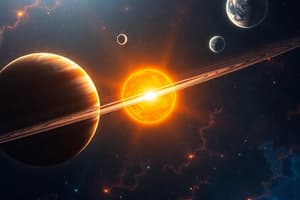Podcast
Questions and Answers
Which planet has the largest volcano in our solar system?
Which planet has the largest volcano in our solar system?
- Earth
- Jupiter
- Mars (correct)
- Venus
What is the main composition of Jupiter and Saturn?
What is the main composition of Jupiter and Saturn?
- Nitrogen and oxygen
- Methane and ammonia
- Carbon dioxide and oxygen
- Hydrogen and helium (correct)
Which planet has the thickest atmosphere in our solar system?
Which planet has the thickest atmosphere in our solar system?
- Mars
- Venus (correct)
- Earth
- Jupiter
Which dwarf planet is slightly larger than Pluto?
Which dwarf planet is slightly larger than Pluto?
Which planet has a highly elliptical orbit?
Which planet has a highly elliptical orbit?
What is the coldest planet in our solar system?
What is the coldest planet in our solar system?
Which planet has a strong magnetic field?
Which planet has a strong magnetic field?
What is the region of icy bodies beyond Neptune?
What is the region of icy bodies beyond Neptune?
Which planet has a tilted axis, resulting in extreme seasons?
Which planet has a tilted axis, resulting in extreme seasons?
Which planet is known for its prominent ring system?
Which planet is known for its prominent ring system?
Flashcards are hidden until you start studying
Study Notes
Planets in Our Solar System
Terrestrial Planets
- Mercury:
- Closest to the sun
- Smallest planet in our solar system
- Highly elliptical orbit
- No atmosphere
- Mars:
- Known as the Red Planet due to its reddish appearance
- Has polar ice caps
- Has the largest volcano in our solar system, Olympus Mons
- Has a thin atmosphere
- Earth:
- Third planet from the sun
- Only known planet to support life
- Has a diverse range of environments and ecosystems
- Has a moderate atmosphere
- Venus:
- Hottest planet in our solar system
- Thickest atmosphere, composed mostly of carbon dioxide
- Has a very slow rotation period
- Has a surface hidden by thick clouds
Jovian Planets
- Jupiter:
- Largest planet in our solar system
- Composed mostly of hydrogen and helium
- Has a massive storm known as the Great Red Spot
- Has a strong magnetic field
- Saturn:
- Known for its prominent ring system
- Composed mostly of hydrogen and helium
- Has at least 62 moons
- Has a less prominent magnetic field compared to Jupiter
- Uranus:
- Tilted axis, resulting in extreme seasons
- Composed mostly of hydrogen, helium, and methane
- Has a thin ring system
- Has a magnetic field
- Neptune:
- Coldest planet in our solar system
- Composed mostly of hydrogen, helium, and methane
- Has a strong wind system
- Has a faint ring system
Other Planets
- Dwarf Planets:
- Pluto: reclassified as a dwarf planet in 2006
- Eris: slightly larger than Pluto
- Haumea: has an irregular shape
- Makemake: has a highly inclined orbit
- Other Bodies:
- Kuiper Belt: a region of icy bodies beyond Neptune
- Oort Cloud: a distant, spherical shell of icy bodies
- Asteroid Belt: a region of rocky bodies between Mars and Jupiter
Studying That Suits You
Use AI to generate personalized quizzes and flashcards to suit your learning preferences.




